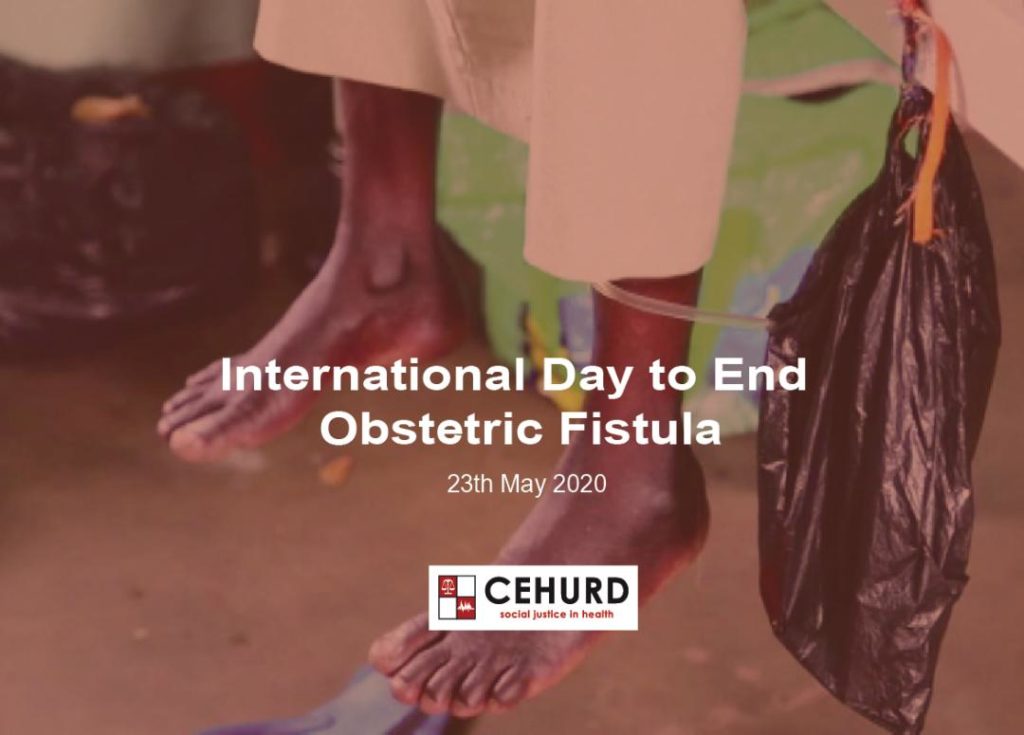Earlier this week, the world marked International Day to End Fistula. Edith Sifuna , a programme officer in the CPN Programme discusses the condition and how the response to COVID-19 is an opportunity to create awareness about obstetric fistula.
In May 2020, the World Health Organisation (WHO) declared Obstetric fistula as preventable and can largely be avoided by delaying the age of first pregnancy; the cessation of harmful traditional practices; and timely access to obstetric care. The fight to end fistula, one of the most serious and tragic injuries that can occur during childbirth, could be threatened by the current COVID-19 pandemic. Due to the pandemic, it is expected that 13 million more child marriages could take place by 2030 that would have otherwise as a result of economic pressure. As we marked this year’s International Day to End Fistula under the theme; “End gender inequality! End health Inequalities! End Fistula Now!” it is important that the international community comes up significantly to raise awareness and intensify actions towards ending Obstetric Fistula.
At the beginning of 2020, the World Health Organisation (WHO) confirmed COVID-19 as a public health emergency of international concern. The virus has put a strain on health systems worldwide. Countries including Uganda have put guidelines and directives in place to curb its spread. While these have indeed worked to stop the spread of the virus, they have adverse effects on public health systems, particularly maternal health.
In the midst of all these efforts, there is a danger that may take many women’s lives or inflict permanent physical and social injury. This seldom talked about danger is obstetric fistula. Obstetric Fistula has been placed among the most neglected components of maternal health during COVID-19 yet it is likely to have a devastating impact on the wellbeing of both women and girls of ages 15 to 49 years. Obstetric Fistula occurs as a result of prolonged obstructed labour, which is usually associated with delays in seeking and receiving appropriate emergency obstetric care. This leads to a hole developing either between the rectum and vagina or bladder and vagina leading to odour, infertility and chronic infection.

In Uganda, apart from the low quality health care, fistula cases have been on the increase due to different cultural practices such as child marriages for economic gains by the parents/guardians, child prostitution resulting into early unplanned pregnancies, and traditional practices like female genital mutilation. These have highly exposed women within the reproductive age to complications at delivery as their bodies are not biologically ready to support a pregnancy, increasing chances of complicated child deliveries. This has been coupled with high poverty rates, especially among women, which deters access to quality health care services.
According to a Uganda Demographic and Health Survey (UDHS) report, a reduction in fistula prevalence from three per cent in 2006 to two per cent in 2011 was reported. Notably, 62 per cent of the affected women received treatment. Despite the treatment and efforts to curb the disease, it still affects the health, social, economic and psychological wellbeing of women, gradually affecting their productivity as individuals and the family.
In addition to the effects already mentioned, fistula also leads to inability to hold urine for a long time, persistent abdominal pains, failure to give birth again, low sex drive and discrimination from family, society and premployment.
Despite the fact that Fistula can be prevented and treated, the survivors continue to suffer from shame, rejection, isolation, trauma and stigma from partners and communities even after treatment and recovery. Gender based violence has also been noted to increase as men opt to find other women who are free from fistula. Domestic violence also stems from the economic strain on the family in the form of costs for surgeries to repair the damage, and purchase of recovery materials and equipment like adult pampers and medicines. With this, most Fistula cases go untreated as women are afraid to admit to the condition or too poor to afford the treatment. As women continue staying safe at home, they are likely to give birth at home assisted by traditional birth attendants or while they are trying to access healthcare facilities. These circumstances can lead to obstructed labour.
“COVID19 has increased the effects of fistula due to restricted movement, patients with fistula repairs were not able to access hospitals to have their repairs done as only emergency cases were being handled while others were stranded as they could not go back home after treatment. Fistula cases have increased due to failure to access hospitals early for delivery or antenatal care resulting in obstructed labour complications such as bladder injuries, fistula and morbidity. It was really absurd that a lady lost her baby as she could not reach the nearby health facility in Bussi and receive treatment as a result of restricted movement and she is now suffering from effects of birth complications and fistula. If this woman had accessed healthcare services on time, her baby would have been saved and complications avoided. With the current trend, there will be many cases of women suffering from fistula, childbirth complications and morbidity. It is therefore important that women are given easy access to hospitals despite COVID-19 and the restrictions. Proper structures for management of complications due to obstructed labour should also be put in place. It is important to strengthen community structures to identify, monitor and refer women for treatment.” A Fistula Surgeon!
With all efforts geared towards COVID-19, it is easy to overlook conditions such as fistula. It is therefore necessary that a comprehensive and holistic fistula care and prevention approach is put in place to restore and preserve the confidence and dignity of victims. This can only be realised if the Government and different stakeholders create awareness about prevention and treatment of obstetric fistula in this era, integrating this into the current guidelines. As women continue staying safe at home, they are likely to give birth at home, from Traditional Birth Attendants or along the way while trying to access health care facilities and may be faced with obstructed labour. Health services have become overloaded and maternal health care services somehow neglected as all efforts are geared towards COVID-19.
It is imperative that there is timely access to comprehensive safe delivery services and emergency obstetric care through bridging the unmet need for maternal health care to prevent women from suffering as they perform their natural maternal function. Maternal mortality is a major challenge in Uganda and any set back in the health system will increase the rate at which women die hence the need to come up with quick and effective medical interventions and guidelines for women to easily access health care services to minimize preventable complications due to delay to access health services and information.
In the current COVID-19 situation, it is important that sexual and reproductive health services such as timely obstetric care and treatment for fistula patients are easily accessible. Information on the same should also be available, not to mention the need to strengthen patient referral and follow up mechanisms.
We must therefore stand together to prevent childbirth complications such as Obstetric Fistula. We can do this by providing comprehensive and universal quality maternal health care services and information, and prioritising women with existing fistula conditions in the face of COVID-19. This is because Obstetric Fistula is a serious and potentially tragic condition. A multi-sectoral approach to raising awareness and intensifying actions towards ending it would therefore restore hope, joy and self-esteem among women as they continue performing their maternal right during the COVID-19 pandemic.

